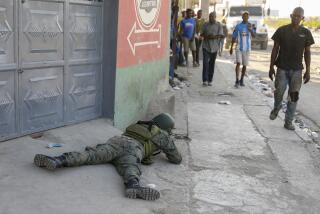Christopher Calls for Unity on Haiti : Caribbean: GOP leaders reject consensus appeal, pledge to confront Administration. Secretary of state acknowledges public is reluctant to intervene militarily.
- Share via
WASHINGTON — Secretary of State Warren Christopher called Sunday for national unity behind President Clinton’s plan to use U.S. troops if necessary to expel Haiti’s current regime--but leading Republicans in Congress pledged to challenge the plan.
“The one thing I would urge at the present time is that people recognize the importance of unity in this situation if we are to persuade (Lt.) Gen. Raoul Cedras and Mr. Michel-Joseph Francois to leave of their own accord,” Christopher said. Army commander Cedras led the coup that drove democratically elected President Jean-Bertrand Aristide from power in September, 1991, and Francois is the feared police chief of Port-au-Prince.
Republican leaders rejected the appeal for consensus and instead pledged to confront the Clinton Administration in Congress. Senate Minority Leader Bob Dole (R-Kan.) said lawmakers will seek a formal debate on the invasion idea and will challenge the President’s intention to use military force.
“We’d like to have a debate. . . . If they’re not going to find out from anybody else, at least Congress ought to be out there trying to inform the American people. Is there any real national interest in Haiti?” Dole said on CBS’ “Face the Nation.”
“I don’t think a United States invasion will do anything but, over time, exacerbate their (Haitians’) problems rather than help them,” said Sen. John McCain of Arizona, a Republican member of the Armed Services Committee and a former Vietnam prisoner of war.
Christopher acknowledged that the public is still “reluctant” to intervene in Haiti, according to recent polls. But he said Clinton may have to proceed with an invasion anyway.
“Sometimes a President has a responsibility,” Christopher said. “He has to do what is in the nation’s interest, and I think that if it comes the time when we have to use military force, President Clinton will explain carefully and fully to the American people what the reasons are, and I hope and believe we’ll have their support at that point.”
Dole predicted that the invasion plan would lose if it came to a vote in the Senate now, in part because the White House has not properly consulted lawmakers on the justification for it.
“The President would lose because he has not made the case,” Dole said.
But Christopher said on NBC’s “Meet the Press” that the Administration has consulted more than 75 times with small and large congressional delegations this year alone. He and other Administration officials echoed the traditional executive-branch position that the President has the authority to order military action without congressional approval.
The tension underscored the wide divide that remains between the White House and Congress on Haiti even as officials indicated that a possible U.S.-led attack against the military junta is nearing.
Dole said Sunday that he thinks the Administration has made up its mind and that the invasion will begin in the next two or three weeks. Madeleine Albright, the U.S. ambassador to the United Nations, said that the time for an invasion is close, while Christopher said diplomatic efforts have now been “exhausted.”
“Time is running out” for Haiti’s top military leaders, Christopher said. “I hope they leave very promptly, but their days are numbered and they will leave one way or another, either soft or hard.”
The White House has said Clinton will begin a renewed effort to outline his position and intentions this week. So far there has been no sustained White House public education effort on the matter.
During the last month, the Cuban refugee crisis and the legislative struggles with the crime bill and health reform plan have distracted national attention from the approaching Haiti confrontation and may have precluded the kind of support-building blitz that then-President George Bush waged before the Panama and Persian Gulf military actions.
Christopher also rejected recent charges by former Vice President Dan Quayle and former presidential candidate Ross Perot that Clinton wants to use an invasion to boost his political standing just weeks before midterm elections.
“The timing of it is really dictated by what’s going on in Haiti. We seem to be running out of other options,” he said.
Yet the Administration is facing continued skepticism about its position on Haiti.
McCain said an invasion would be harmful to U.S. foreign policy interests in the short term and unsuccessful in Haiti over the long term.
Although U.S. forces and materiel dwarf the 7,000-member Haitian military, the United States is unlikely to be able to pacify the country, he said. Cedras and his supporters would eventually melt into the population and foment resistance and a repetition of the turmoil witnessed during the 1915-34 U.S. occupation, he said.
McCain also said the President lacks domestic support for military intervention.
“Most of us in Congress, with the exception of the Congressional Black Caucus, are strenuously opposed or at least have strong reservations about the possible intervention. . . . Basically, there is no exit strategy and (it) clearly is a United States operation with a very small fig leaf of 266 (Caribbean) troops who we’re in the process of training now,” McCain said on “Meet the Press.”
The embattled Haiti policy also took some hits from the Democratic side Sunday, as Senate Majority Leader George J. Mitchell of Maine said he would prefer to have the President go before Congress before taking military action.
“The President should seek congressional approval, even though it’s not legal or necessary, to build support in the country. But no President has ever agreed with me, and I don’t think this one does either,” Mitchell said on “Face the Nation.”
More to Read
Sign up for Essential California
The most important California stories and recommendations in your inbox every morning.
You may occasionally receive promotional content from the Los Angeles Times.













